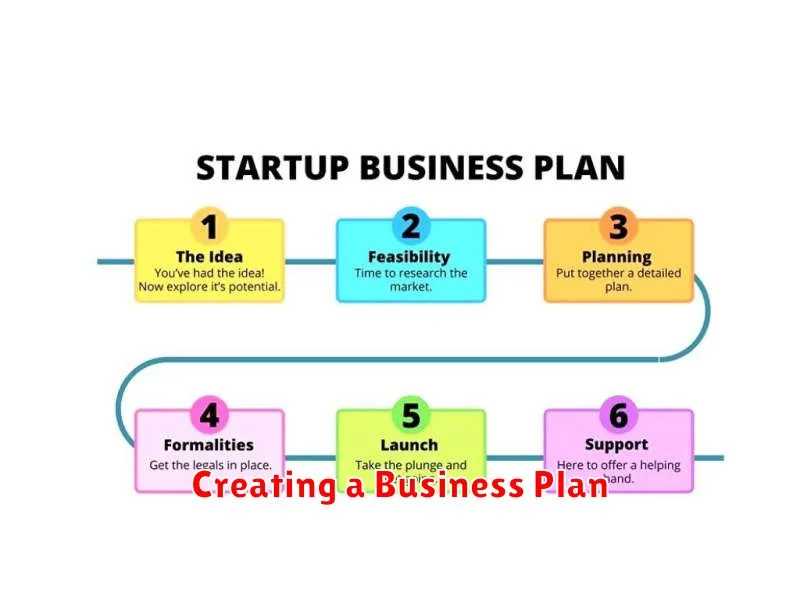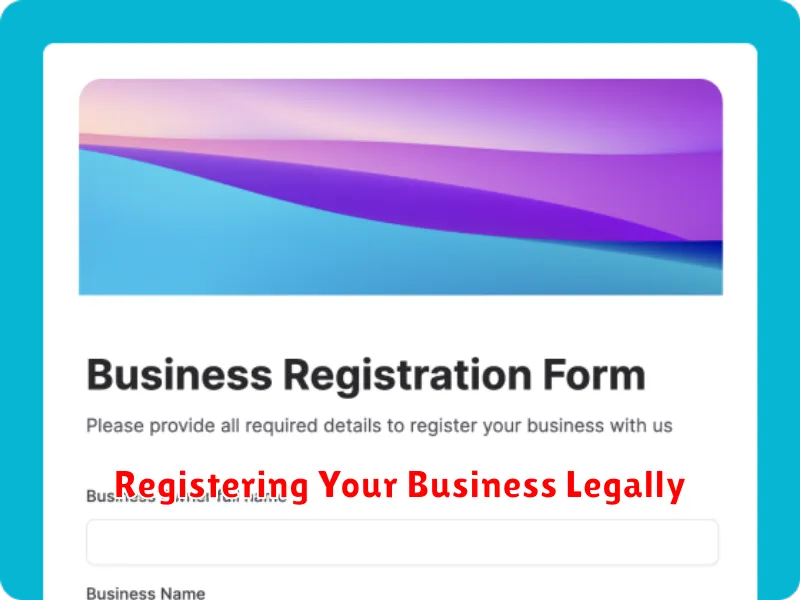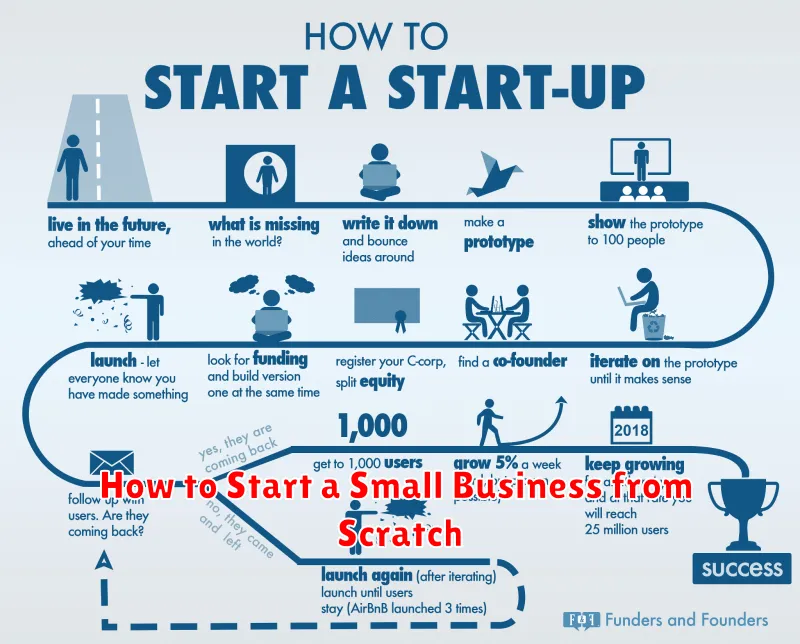Starting a small business can be a challenging but rewarding experience. Many aspiring entrepreneurs dream of turning their passion into a profitable venture. This guide will provide you with a comprehensive roadmap on how to start a small business from scratch, covering everything from initial ideation to launching your operations. Whether you’re looking to start a small online business, a brick-and-mortar store, or a service-based company, this guide will equip you with the essential knowledge and practical steps necessary for success.
Building a small business from scratch requires careful planning and execution. This guide will delve into key aspects of small business development, including market research, crafting a small business plan, securing funding, navigating legal requirements, and implementing effective marketing strategies. By following these steps, you can transform your small business idea into a thriving reality, achieve financial independence, and contribute to the economy. We’ll address common challenges encountered by small businesses and offer practical solutions to overcome them. Learn how to effectively manage your resources, build a strong brand, and cultivate lasting customer relationships. This journey into the world of small business ownership begins with a single step, and we’re here to guide you every step of the way.
Is Starting a Business Right for You?
Launching a business is a significant decision. It requires careful self-reflection to determine if entrepreneurship aligns with your personality, skills, and long-term goals. Honest self-assessment is crucial.
Consider these key questions:
- Are you comfortable with risk and uncertainty?
- Do you possess the discipline and self-motivation to work independently?
- Are you prepared to invest the necessary time and resources, potentially forgoing immediate financial stability?
- Can you handle stress and make difficult decisions under pressure?
- Are you passionate about your business idea and willing to dedicate yourself to its success?
Entrepreneurship can be incredibly rewarding, offering autonomy, flexibility, and the potential for substantial financial gain. However, it also demands significant sacrifice, hard work, and resilience.
Researching the Market
Thorough market research is essential for a successful business launch. It helps you understand your target audience, competition, and overall market landscape.
Identifying Your Target Audience
Defining your ideal customer is crucial. Consider demographics like age, location, and income. Understanding their needs, preferences, and buying habits will inform your product development and marketing strategies.
Analyzing the Competition
Identify your main competitors. Analyze their strengths and weaknesses, pricing strategies, and marketing efforts. This analysis will help you differentiate your business and identify opportunities.
Market Size and Trends
Research the overall market size and growth potential. Understanding current trends and future projections can help you assess the viability and long-term sustainability of your business idea.
Creating a Business Plan

A comprehensive business plan is essential for launching a successful small business. It serves as a roadmap, guiding your decisions and helping you secure funding.
Key components of a business plan include:
- Executive Summary: Briefly outlines your business concept, market analysis, and financial projections.
- Company Description: Details your business’s mission, legal structure, and products or services.
- Market Analysis: Identifies your target market, competitors, and industry trends.
- Organization and Management: Outlines your business structure and management team.
- Service or Product Line: Describes your offerings and their value proposition.
- Marketing and Sales Strategy: Explains how you’ll reach and acquire customers.
- Financial Projections: Includes projected income statements, cash flow statements, and balance sheets.
- Funding Request (if applicable): Specifies the amount of funding needed and how it will be used.
While creating a business plan can be time-consuming, it’s a valuable investment that can significantly increase your chances of success.
Registering Your Business Legally

Once you’ve developed your business plan and secured necessary funding, you must register your business legally. This crucial step protects your business and provides numerous benefits.
Choose a Business Structure: Selecting the right structure (sole proprietorship, partnership, LLC, corporation) impacts your liability, taxes, and administrative burden. Consider consulting with a legal professional to determine the most suitable option for your specific needs.
Register Your Business Name: You’ll likely need to register your business name with your state or local government. This process may involve checking for name availability and filing the required paperwork. A Doing Business As (DBA) name may be necessary if your business operates under a different name than your legal name.
Obtain Necessary Licenses and Permits: Depending on your business type and location, you may require specific licenses and permits to operate legally. Research your industry and local regulations to ensure compliance.
Employer Identification Number (EIN): If you plan to hire employees or operate as a corporation or partnership, you’ll need to obtain an EIN from the IRS.
Setting Up a Business Bank Account

Once you’ve legally structured your business, a crucial next step is opening a dedicated business bank account. This separates your personal and business finances, which is essential for financial organization, tax purposes, and building business credit.
Choosing the right bank involves considering factors like transaction fees, minimum balance requirements, and online banking features. Research different banks and compare their offerings to find the best fit for your business needs.
When you’re ready to open the account, you’ll typically need to provide documentation such as your business registration paperwork (e.g., Articles of Incorporation or DBA), your Employer Identification Number (EIN) if you have one, and potentially your personal identification.
Keeping accurate records of your business transactions within your dedicated account will significantly simplify your accounting processes and tax preparation.
Finding the Right Location or Platform
Choosing the right location or platform is a critical step in starting a small business. Your choice significantly impacts visibility, accessibility, and overall operational costs.
Brick and Mortar Businesses
For businesses requiring a physical presence, consider factors like foot traffic, proximity to your target market, competition, and lease terms. A highly visible location often comes with higher rent, so carefully weigh the cost-benefit. Accessibility for customers, including parking and public transportation access, is also essential. Research local demographics to ensure alignment with your target customer profile.
Online Businesses
If operating online, your platform choice is equally important. Consider using established marketplaces like Etsy or Amazon for faster setup and access to existing customer bases. Creating your own e-commerce website offers greater control over branding and customer experience, but demands more technical expertise and marketing effort. Social media platforms can also serve as valuable sales and marketing channels, depending on your product or service.
Hybrid Approach
Some businesses benefit from combining both physical and online presence. This approach can expand reach and offer customers greater flexibility. Carefully consider the logistical and resource implications of managing both a physical storefront and an online platform.
Launching Your First Product or Service
This stage marks the culmination of your planning and preparation. A successful launch requires careful execution and attention to detail. Marketing and promotion are crucial for generating initial interest and sales.
Consider these key aspects for your product/service launch:
- Target Audience: Focus your marketing efforts on reaching your ideal customer. Understand their needs and preferences.
- Marketing Channels: Utilize a mix of online and offline channels to reach your target audience. This might include social media, email marketing, local advertising, or public relations.
- Launch Event: Consider hosting a launch event (virtual or in-person) to create buzz and excitement.
- Early Feedback: Gather feedback from early customers to identify areas for improvement and refine your offering.
Monitor key metrics after launch, such as sales, website traffic, and customer feedback. This data will provide valuable insights into the effectiveness of your launch strategy and inform future business decisions.

